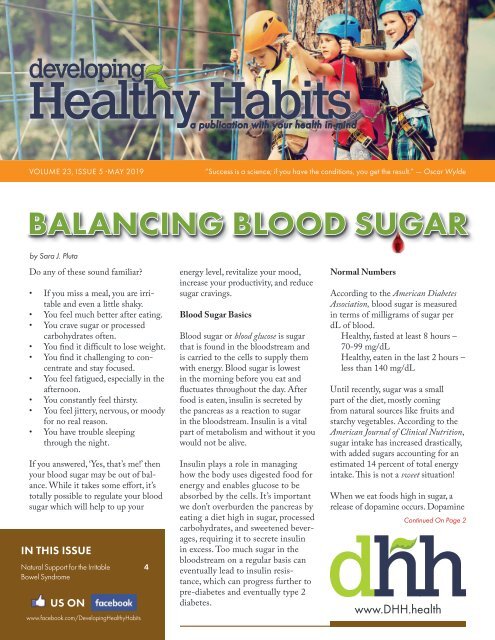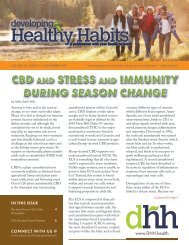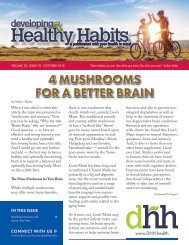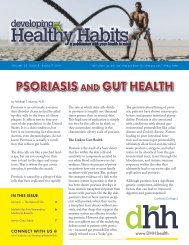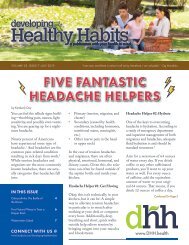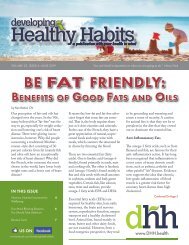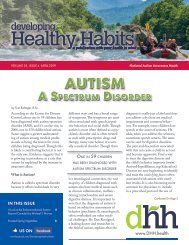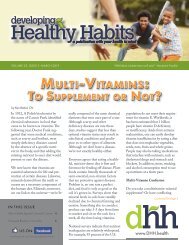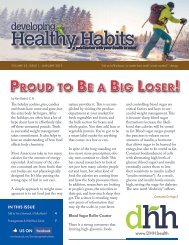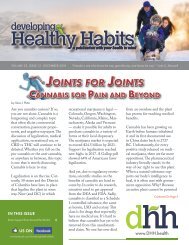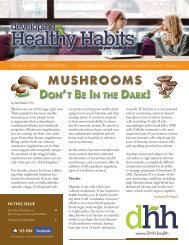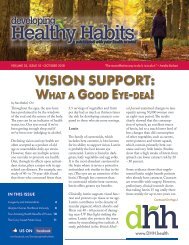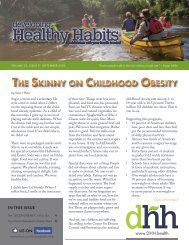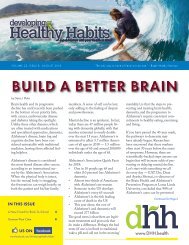You also want an ePaper? Increase the reach of your titles
YUMPU automatically turns print PDFs into web optimized ePapers that Google loves.
VOLUME 23, ISSUE 5 ·MAY <strong>2019</strong><br />
“Success is a science; if you have the conditions, you get the result.” — Oscar Wylde<br />
BALANCING BLOOD SUGAR<br />
by Sara J. Pluta<br />
Do any of these sound familiar?<br />
• If you miss a meal, you are irritable<br />
and even a little shaky.<br />
• You feel much better after eating.<br />
• You crave sugar or processed<br />
carbohydrates often.<br />
• You find it difficult to lose weight.<br />
• You find it challenging to concentrate<br />
and stay focused.<br />
• You feel fatigued, especially in the<br />
afternoon.<br />
• You constantly feel thirsty.<br />
• You feel jittery, nervous, or moody<br />
for no real reason.<br />
• You have trouble sleeping<br />
through the night.<br />
If you answered, ‘Yes, that’s me!’ then<br />
your blood sugar may be out of balance.<br />
While it takes some effort, it’s<br />
totally possible to regulate your blood<br />
sugar which will help to up your<br />
IN THIS ISSUE<br />
Natural Support for the Irritable<br />
Bowel Syndrome<br />
US ON<br />
www.facebook.com/DevelopingHealthyHabits<br />
4<br />
energy level, revitalize your mood,<br />
increase your productivity, and reduce<br />
sugar cravings.<br />
Blood Sugar Basics<br />
Blood sugar or blood glucose is sugar<br />
that is found in the bloodstream and<br />
is carried to the cells to supply them<br />
with energy. Blood sugar is lowest<br />
in the morning before you eat and<br />
fluctuates throughout the day. After<br />
food is eaten, insulin is secreted by<br />
the pancreas as a reaction to sugar<br />
in the bloodstream. Insulin is a vital<br />
part of metabolism and without it you<br />
would not be alive.<br />
Insulin plays a role in managing<br />
how the body uses digested food for<br />
energy and enables glucose to be<br />
absorbed by the cells. It’s important<br />
we don’t overburden the pancreas by<br />
eating a diet high in sugar, processed<br />
carbohydrates, and sweetened beverages,<br />
requiring it to secrete insulin<br />
in excess. Too much sugar in the<br />
bloodstream on a regular basis can<br />
eventually lead to insulin resistance,<br />
which can progress further to<br />
pre-diabetes and eventually type 2<br />
diabetes.<br />
Normal Numbers<br />
According to the American Diabetes<br />
Association, blood sugar is measured<br />
in terms of milligrams of sugar per<br />
dL of blood.<br />
Healthy, fasted at least 8 hours –<br />
70-99 mg/dL<br />
Healthy, eaten in the last 2 hours –<br />
less than 140 mg/dL<br />
Until recently, sugar was a small<br />
part of the diet, mostly coming<br />
from natural sources like fruits and<br />
starchy vegetables. According to the<br />
American Journal of Clinical Nutrition,<br />
sugar intake has increased drastically,<br />
with added sugars accounting for an<br />
estimated 14 percent of total energy<br />
intake. This is not a sweet situation!<br />
When we eat foods high in sugar, a<br />
release of dopamine occurs. Dopamine<br />
Continued On Page 2<br />
www.DHH.health
BALANCING BLOOD SUGAR — Continued from Page 1<br />
Developing Healthy Habits<br />
Published by:<br />
Developing Healthy Habits, LLC.<br />
3275 S. John Young Parkway, Suite 152<br />
Kissimmee, FL 34746<br />
1-800-713-2802<br />
www.DHH.health<br />
Executive Editor<br />
Mark A. Carroll<br />
Managing Editor<br />
Sandra Michalski<br />
Associate Editor<br />
Nicholas A. Carroll<br />
Design<br />
NXS Designs<br />
JAM Graphics Design<br />
Contributors<br />
Michael T. Murray<br />
Sara J. Pluta<br />
To subscribe visit:<br />
www.DHH.health<br />
For content contribution contact:<br />
Sandra@DevelopingHealthyHabits.com<br />
For advertising inquires contact:<br />
Nick@DevelopingHealthyHabits.com<br />
is the neurotransmitter that controls<br />
reward and pleasure. The more<br />
sugar you eat, the more your body<br />
needs to have the same pleasurable<br />
sensation. This can lead to a vicious<br />
cycle of sugar addiction. Another<br />
reason (aside from how delicious<br />
it tastes) quitting sugar can be so<br />
challenging.<br />
And yet with millions of Americans<br />
suffering from some form of insulin<br />
resistance and with diabetes now<br />
affecting one in three Americans,<br />
it is vital we start making changes<br />
now. Fortunately, we do have control<br />
over our lifestyle choices, particularly<br />
nutrition, an important ingredient<br />
in balancing our blood sugar.<br />
How to Maintain Normal Blood<br />
Sugar<br />
1. Avoid foods and beverages that<br />
spike blood sugar. These include<br />
processed sugar, breads, pasta,<br />
white rice, crackers, cookies,<br />
candies, soda, fruit juice and<br />
dried fruit. Choose unprocessed<br />
foods in their whole form.<br />
2. Eat balanced meals that contain<br />
protein, fat and some complex<br />
carbohydrates with fiber. These<br />
help to encourage the glucose<br />
from the meal to enter the<br />
blood stream more slowly. Think<br />
sweet potatoes with the skin on,<br />
grass-fed meats, wild-caught<br />
fish, eggs, full-fat dairy, nuts<br />
and seeds, legumes and most<br />
vegetables.<br />
3. Rather than eating one or two<br />
big meals per day which can<br />
cause bigger shifts in blood sugar,<br />
smaller, more frequent balanced<br />
meals help to maintain steadier<br />
blood sugar levels. Snacks like<br />
a handful of almonds, a hardboiled<br />
egg, a piece of beef jerky,<br />
or half of an apple with peanut<br />
butter are ideal. Try not to get<br />
too hungry, however, there is no<br />
need to eat constantly.<br />
4. Eat breakfast. With all the hype<br />
on fasting, skipping breakfast is<br />
becoming more popular. While<br />
fasting has its own benefits, for<br />
someone looking to balance<br />
blood sugar, it is smarter to eat<br />
a breakfast with protein and fat<br />
within an hour of waking.<br />
5. Make sure you are getting<br />
enough protein. When we eat<br />
protein at every meal, it helps to<br />
slow the release of glucose into<br />
the bloodstream. Protein is vital<br />
to cellular repair and muscle<br />
growth.<br />
6. Fats are your friend. Eat healthy<br />
fats like coconut oil, butter, avocado<br />
oil, nuts and seeds at every<br />
Continued On Page 7<br />
Mission Statement:<br />
“Our mission is to continually provide<br />
a well written and clearly presented<br />
newsletter that is devoted to<br />
empowering individuals<br />
to make educated decisions relating to<br />
their health and wellness.”<br />
The statements and products in this newsletter<br />
have not been evaluated by the Food and Drug<br />
Administration and are not intended to diagnose,<br />
treat, cure or prevent any disease.<br />
2 <strong>May</strong> <strong>2019</strong> • www.DHH.health
NATURAL SUPPORT FOR THE<br />
IRRITABLE BOWEL SYNDROME<br />
by Michael T. Murray, N.D.<br />
The irritable bowel syndrome (IBS)<br />
is characterized by some combination<br />
of abdominal pain or distension;<br />
altered bowel function, constipation,<br />
or diarrhea; hypersecretion of colonic<br />
mucus; symptoms of indigestion such<br />
as flatulence, nausea, or loss of appetite;<br />
and varying degrees of anxiety<br />
or depression. IBS is a functional<br />
disorder of the large intestine. What<br />
this means is that there is no disease<br />
process per se or evidence of accompanying<br />
structural defect. It simply<br />
reflects that the digestive process is<br />
not functioning as it should.<br />
What causes Irritable Bowel<br />
Syndrome?<br />
There are four main causes of IBS<br />
that have been identified over the<br />
years: stress, insufficient intake of<br />
dietary fiber, food intolerance/allergy,<br />
and meals too high in sugar.<br />
Stress, Sleep, and Digestive Function<br />
Stress is a big factor in disrupting gut<br />
function. It can disrupt motility, the<br />
rhythmic contractions of the intestine<br />
that propel food through the digestive<br />
tract, as well as lead to abdominal<br />
pain and irregular bowel functions.<br />
Strategies to decrease stress, such as<br />
physical exercise, meditation, yoga,<br />
and tai chi have been shown to produce<br />
significant improvements in IBS.<br />
Getting enough sleep each night is<br />
also helpful. Eating in a relaxed manner<br />
with mindfulness and thoroughly<br />
chewing your food also helps improve<br />
overall digestive function.<br />
Important Dietary Factors in<br />
Irritable Bowel Syndrome<br />
The three most important dietary<br />
factors that contribute to IBS are food<br />
intolerances, sugar and low dietary<br />
fiber.<br />
• Food allergy, sensitivities and<br />
intolerances are a major cause<br />
of IBS. This link has been wellknown<br />
since the early 1900s.<br />
More recent studies have shown<br />
the majority of patients with IBS<br />
(approximately two-thirds) have<br />
at least one food intolerance,<br />
and some have multiple allergies.<br />
The most common offending<br />
foods are dairy products (forty to<br />
forty-four percent) and glutencontaining<br />
grains (forty to sixty<br />
percent). Many patients have<br />
noted marked clinical improvement<br />
when using elimination<br />
diets that simply eliminate dairy<br />
and sources of gluten.<br />
• Sugar consumption contributes to<br />
IBS in many people. After a high<br />
sugar meal, the normal rhythmic<br />
contractions of the gastrointestinal<br />
tract slow down and in some<br />
portions of the intestines stop<br />
altogether. A diet high in refined<br />
sugar may be the most important<br />
contributing factor to IBS being<br />
Continued On Page 6<br />
4 <strong>May</strong> <strong>2019</strong> • www.DHH.health
PLATINUM SPONSOR<br />
WHAT<br />
JUNE 3-9, <strong>2019</strong><br />
WE DO MAKES<br />
A DIFFERENCE.<br />
CREATING CHANGE AROUND HEMP IN THE MINDS OF MILLIONS<br />
WASN’T AN EASY TASK BUT, COLLECTIVELY, WE DID IT.<br />
In the new and emerging hemp CBD market, many companies<br />
claim to be the best or most trusted, and it can be hard to<br />
know who to believe or what brand to choose. Being natural<br />
products industry experts, we know it’s more than just the<br />
products that matter. That’s why, at PlusCBD Oil , what we do<br />
is truly different.<br />
+ Vertically Integrated - Offering Full Traceability –<br />
From Seed to Shelf <br />
+ Unparalleled Quality Control<br />
+ Independent Third-Party and DNA Testing<br />
+ QR Codes on Every Label for Increased Transparency<br />
+ Human Clinical Testing Proving Efficacy<br />
+ Generally Recognized as Safe (GRAS) Self-Determination<br />
+ Widest Product Selection Available<br />
TM<br />
HEMP-DERIVED CBD OIL<br />
#<br />
1 SELLING HEMP CBD PRODUCTS*<br />
AVAILABLE IN HEALTH FOOD STORES NATIONWIDE<br />
PLUSCBDOIL.COM I (855) PLUS-CBD (758-7223)<br />
*SPINS SCAN DATA<br />
A CV SCIENCES BRAND
IRRITABLE BOWEL SYNDROME — Continued from Page 4<br />
such a common condition in the<br />
United States.<br />
• Dietary fiber promotes proper<br />
colon function. Patients with<br />
constipation are much more likely<br />
to respond to dietary fiber than<br />
those with diarrhea. Increasing<br />
intake of dietary fiber from fruit<br />
and vegetable sources rather than<br />
grains may offer more benefit to<br />
some individuals.<br />
Dietary Supplements for Irritable<br />
Bowel Syndrome<br />
Digestive enzymes can help breakdown<br />
large food molecules into smaller<br />
units. When digestion is incomplete,<br />
it leads to lots of problems with gas,<br />
bloating and indigestion, which are<br />
also the key symptoms in IBS. A high<br />
potency, multi-enzyme formula can<br />
really help relieve these symptoms.<br />
For specific food intolerance issues<br />
like lactose, casein, gluten and other<br />
food components, there are digestive<br />
enzyme products available that are<br />
tailored for these foods. Dosage: follow<br />
label instructions.<br />
Berberine is an alkaloid found in<br />
many plants, such as goldenseal<br />
(Hydrastis canadensis) and barberry<br />
(Berberis vulgaris). Berberine can<br />
really help in IBS, especially if it<br />
is due to small intestinal bacterial<br />
overgrowth (SIBO). Several studies<br />
suggest berberine may be effective<br />
in IBS. In animal models, berberine<br />
improves intestinal motility.<br />
This action is another key goal in<br />
patients with IBS and SIBO. In a<br />
2015 double-blind study published<br />
in Phytotherapy Research, 196 patients<br />
with diarrhea predominant IBS were<br />
randomized to receive either berberine<br />
(200 mg) or a placebo (vitamin C<br />
200 mg) twice a day for eight weeks.<br />
The berberine group, but not the<br />
placebo group, reported significant<br />
improvement in diarrhea and less<br />
urgency and frequency in defecation.<br />
The berberine group also experienced<br />
a 64.6% reduction in abdominal<br />
pain compared with initial scores<br />
at the end of the study. Berberine<br />
significantly decreased the overall<br />
IBS symptom score, anxiety score<br />
and depression score. Lastly, and not<br />
surprisingly, berberine was associated<br />
with an increased quality of life score<br />
in patients while no such change was<br />
seen in the placebo group. Berberine<br />
has been extensively studied in<br />
clinical trials for supporting blood<br />
sugar and cholesterol levels as well as<br />
blood pressure. Dosage: 500 mg two<br />
to three times daily before meals.<br />
Soluble dietary fiber such as psyllium<br />
seed husks, guar gum, or pectin,<br />
either alone or in combination, can<br />
be quite helpful. Dosage: 3 – 5 grams<br />
at bedtime.<br />
Probiotic<br />
supplements<br />
supplying<br />
Lactobacillus<br />
acidophilus and<br />
Bifidobacteria<br />
species. Dosage:<br />
take a product<br />
that will<br />
provide 5 – 20<br />
billion live bacteria<br />
daily.<br />
Final Comment<br />
Sometimes, the person with digestive<br />
disturbances like IBS has to become a<br />
bit of a detective in trying to find out<br />
possible causes as well as solutions.<br />
The key is to keep focusing on ways<br />
to improve digestion and not just<br />
suppress the symptoms.<br />
Author’s Bio:<br />
Michael T. Murray,<br />
N.D., has dedicated<br />
his life to educating<br />
physicians, patients, and<br />
the general public on<br />
the tremendous healing<br />
power of nature. In addition to his<br />
books, which have cumulative sales of<br />
over five million copies sold, Dr. Murray<br />
has written numerous articles for major<br />
publications and appeared on hundreds<br />
of radio and TV programs.<br />
ShotGlass2.375x4.75a_Layout 1 5/31/18 10:56 AM Pag<br />
Healthier Skin & Body<br />
Look & Feel the<br />
Difference<br />
Herbal Bitter - 1st Step for<br />
Digestion, Energy &much more!<br />
• Works Fast & Delicious Flavors.<br />
• Troubled Skin Support<br />
• Gluten Free Cosmetics<br />
Since 1991 • Satisfaction Guaranteed!<br />
1-800-414-ALOE • www.aloelife.com<br />
6 <strong>May</strong> <strong>2019</strong> • www.DHH.health
BALANCING BLOOD SUGAR — Continued from Page 2<br />
meal. Fats also slow the release of<br />
glucose and make you feel fuller<br />
longer. They help prevent a blood<br />
sugar roller coaster.<br />
7. Exercise regularly. Exercise forces<br />
cells in your muscles to use up<br />
glucose for energy and repair<br />
which lowers blood sugar levels.<br />
Regular exercise makes cells more<br />
responsive to insulin. Sweat it<br />
out!<br />
8. Sleep like a baby. A lack of sleep<br />
can raise stress and appetite<br />
hormones (cortisol and ghrelin)<br />
which make us hungry. Have you<br />
ever noticed that when you are<br />
sleep deprived, you crave sugary<br />
snacks and feel hungrier?<br />
9. Hydrate. Thirst is often confused<br />
with hunger. Sometimes a glass<br />
of water is all it takes to stop the<br />
cravings for something sweet. Try<br />
it next time you are eyeing the<br />
candy dish at 3:00 pm.<br />
10. Manage stress. Excess stress can<br />
actually raise blood sugar levels<br />
due to an increased release of<br />
cortisol, the ‘stress hormone.’<br />
This increase in cortisol ups our<br />
cravings for sugary foods and<br />
interferes with our ability to get<br />
quality sleep.<br />
Armed with the do’s and don’ts, here<br />
are a few of my favorite food hacks to<br />
help balance blood sugar.<br />
• Turmeric – use in cooking or<br />
supplement form for blood sugar<br />
stability.<br />
• Cinnamon – antioxidant rich,<br />
delicious, superfood that naturally<br />
lowers blood sugar.<br />
• Apple cider vinegar, lemons and<br />
limes – acetic and citric acid help<br />
control fluctuations in blood<br />
sugar when taken with meals.<br />
• Avocados – rich in minerals, fiber<br />
and healthy fats, as well as a<br />
special sugar molecule that may<br />
lower insulin levels naturally.<br />
It does take commitment, but by<br />
actively working to balance your<br />
blood sugar, you’ll feel more energized,<br />
think more clearly, and be<br />
ready to take on the day. And, you are<br />
taking measures to prevent progression<br />
of more advanced issues like<br />
insulin resistance and pre-diabetes.<br />
Sweet!<br />
Author’s Bio:<br />
Sara j Pluta is a certified<br />
health coach, free-spirited<br />
introvert, and enthusiast<br />
of foggy Redwood groves. Whether she<br />
is supporting her clients on their health<br />
journey, savoring an avocado sprinkled<br />
with sea salt, or sitting under the moonlight,<br />
she's thinking. A wild mind and an<br />
active spirit are at the core of her curiosity<br />
for life. Sara strives to bring sunshine into<br />
the world, one ray at a time. Shine Bright!<br />
Visit her at: www.sjpholistic.com<br />
Facebook: facebook.com/sarajpluta/<br />
Instagram: instagram.com/sarajpluta/<br />
Energy dragging?<br />
Sudden mood changes?<br />
Trouble concentrating?<br />
Sugar cravings?<br />
www.DHH.health • <strong>May</strong> <strong>2019</strong> 7
Pure Power<br />
Concentrated and carefully purified omega-3s<br />
for superior heart, brain, and immune support.*<br />
* These statements have not been evaluated by the Food and Drug Administration.<br />
This product is not intended to diagnose, treat, cure or prevent any disease.


